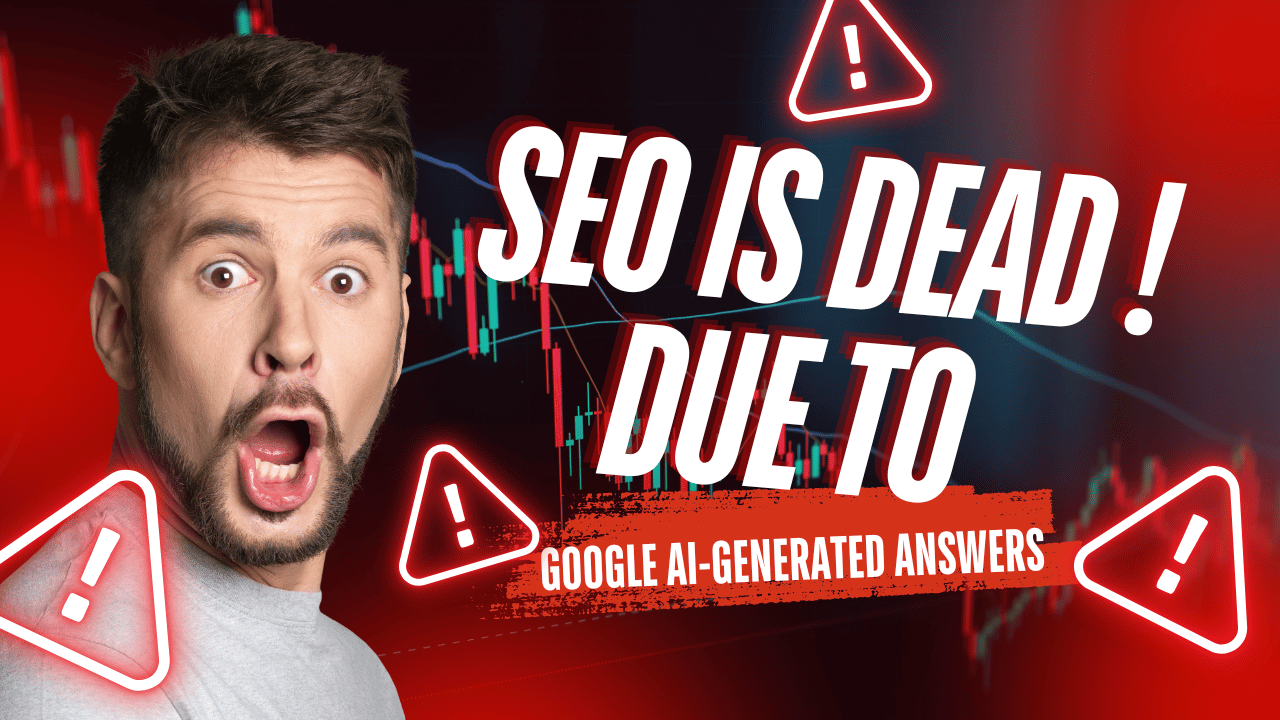SEO
SEO is going to be Dead sooner than you think Due to Google’s incorporation of AI-Generated Answers?
The claim that “Google Search is dead” has become a popular refrain among critics, tech enthusiasts, and users alike in recent years. This notion is largely driven by changes in how Google and other search engines deliver information to users. As Google incorporates artificial intelligence (AI) into its search engine, it has transformed how results are presented, often prioritizing AI-generated answers over traditional organic search results. While these changes signal a major evolution in the way information is accessed, it is premature to declare Google Search dead. Instead, the platform is evolving to meet the demands of a rapidly changing digital landscape.
The Rise of AI in Google Search
Google’s AI-driven approach to search is part of a broader strategy to enhance user experience. Features such as featured snippets, conversational AI tools like Bard, and advanced natural language processing are designed to provide direct, concise answers to user queries. These tools leverage Google’s extensive database and machine learning algorithms to understand and respond to complex questions in ways that were not possible with traditional keyword-based search models.
For example, when users search for “How to bake a cake,” they are no longer limited to a list of links to blogs and recipe sites. Instead, Google often displays a detailed recipe in a featured snippet at the top of the search results, complete with steps and ingredients. Similarly, for fact-based queries such as “What is the capital of France?” AI-driven answers provide instant responses without requiring users to click on external links. This shift towards “instant answers” is a double-edged sword, benefiting users seeking quick information while posing challenges to traditional content discovery.
Why Critics Say Google Search Feels “Dead”
Critics argue that these changes have fundamentally altered the nature of search, leading to a decline in the value of Google Search as a tool for exploration and discovery. Several factors contribute to this perception:
1. Decline in Organic Results Visibility
AI-generated answers and featured snippets now dominate the first page of search results, pushing traditional organic links further down. For businesses, bloggers, and website owners, this reduced visibility translates to lower traffic and diminished opportunities for engagement. Many content creators have expressed frustration, feeling that their work is being effectively “mined” by Google to populate its AI-generated answers without providing adequate credit or traffic in return.
2. Lack of Discovery
Google’s shift towards instant answers can limit the exploratory nature of search. When users receive direct answers, they are less likely to browse multiple sources, potentially missing diverse perspectives or alternative viewpoints. This creates a more insular search experience, where users are fed prepackaged information rather than being encouraged to explore and evaluate a variety of sources.
3. Trust and Accuracy Issues
AI-generated answers are not immune to errors. There have been instances where featured snippets or AI responses have provided inaccurate, outdated, or biased information. Unlike traditional search results, which allow users to verify information by visiting multiple sources, AI-generated answers often present themselves as definitive, which can mislead users who are less inclined to fact-check.
4. User Fatigue with Sponsored Content
Another criticism is the increasing prevalence of sponsored content and advertisements in search results. As paid ads take up more space on the first page, users often need to scroll past several sponsored links before reaching organic results. Coupled with AI-driven answers, this gives the impression that Google is prioritizing monetization over providing a balanced search experience.
5. Frustration Among Content Creators
The rise of AI-generated answers has also sparked debates about intellectual property and fair use. Content creators who invest time and resources in producing high-quality material often feel shortchanged when their content is summarized in Google’s snippets without adequate attribution or compensation. This tension has led to calls for greater transparency and fairness in how Google utilizes third-party content.
Why Google Search Isn’t Dead—It’s Evolving
Despite these criticisms, Google Search remains the most widely used search engine globally, processing billions of queries daily. Rather than signaling the death of search, Google’s embrace of AI reflects an effort to adapt to changing user preferences and technological advancements. Here are several reasons why Google Search continues to thrive:
1. Meeting User Expectations
In an age where speed and convenience are paramount, users increasingly value quick, direct answers for simple queries. Google’s AI-driven features cater to this demand, allowing users to obtain information efficiently. For many, this functionality enhances the overall search experience, particularly for routine questions or fact-based queries.
2. Support for Complex Queries
While AI-generated answers excel at addressing straightforward questions, more complex or nuanced queries still require traditional search results. Users seeking in-depth analysis, specialized knowledge, or diverse perspectives often turn to traditional organic links. For instance, academic research, medical advice, or niche hobbies typically demand more detailed exploration, which Google’s traditional search results continue to facilitate.
3. Coexistence of AI and Traditional Results
Google’s AI features do not entirely replace traditional search results; instead, they coexist. Users can still access a wide range of links, articles, and resources below the AI-generated answers. This hybrid model allows Google to cater to a broad spectrum of user preferences, balancing the need for quick answers with the importance of comprehensive exploration.
4. Continuous Improvement
Google is actively working to address some of the criticisms surrounding its AI-driven search features. Efforts to improve the accuracy and transparency of AI-generated answers, provide clearer attribution to content creators, and refine the balance between organic results and paid ads demonstrate Google’s commitment to enhancing the user experience.
5. Dominance in the Market
Google’s market share and brand recognition remain unparalleled. For most users, Google is synonymous with search. Competitors like Bing, DuckDuckGo, and others have made strides in offering alternative experiences, but none have matched Google’s scale or ubiquity. This dominance underscores Google’s enduring relevance in the search landscape.
The Future of Search
As AI continues to reshape the search experience, the future of Google Search will likely involve further integration of advanced technologies while addressing the concerns raised by users and content creators. Key trends to watch include:
- Personalization: AI has the potential to make search results more personalized, tailoring answers to individual preferences and needs.
- Improved Attribution: Ensuring that content creators receive proper credit and compensation for their work will be critical in maintaining a healthy ecosystem.
- Greater Transparency: Providing users with clearer information about how AI-generated answers are sourced and validated can help build trust.
- Exploration Tools: Enhancing tools that encourage discovery and exploration can counterbalance the limitations of instant answers.
Conclusion
The claim that “Google Search is dead” reflects frustration with the platform’s evolving dynamics rather than an accurate assessment of its utility. While AI-driven features have transformed the search experience, they have not rendered traditional search obsolete. Instead, Google Search is adapting to meet the demands of a digital age characterized by rapid information consumption and technological innovation. By balancing the benefits of AI with the need for transparency, fairness, and user trust, Google has the opportunity to remain a cornerstone of the internet for years to come.

